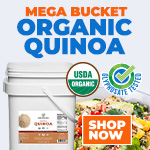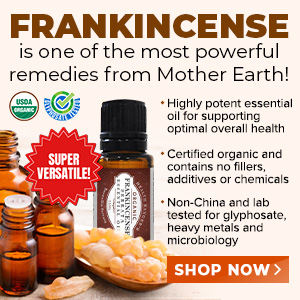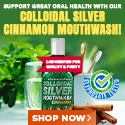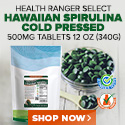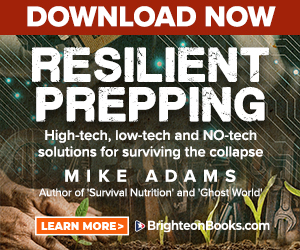
Loma Linda University research confirms antioxidant-rich pecans protect against unhealthy oxidation (press release)
Thursday, November 16, 2006 by: NewsTarget
Tags: health news, Natural News, nutrition
- Chemtrails unveiled: How the CIA and Big Business are manipulating the weather for profit
- Mysterious underwater pyramid off Japan could rewrite ancient history
- Israeli lobbyists boast of controlling US national security policy in leaked AIPAC audio
- Tulsi Gabbard leads charge against the Biden regime’s global censorship of the 'Disinformation Dozen'
- How to live without electricity: A practical guide for survival and preparedness
- Geoengineers forced into secrecy as public backlash grows: How climate elites are manipulating populations to accept geoengineering experiments
- Fauci is back in the limelight, and he’s busy promoting a future COVID or FLU pandemic
- Pfizer's RSV vaccine linked to preterm births as drug giant CONCEALED RISKS from pregnant women in unethical clinical trials
- Common household chemicals linked to America's depression epidemic
- The HEART-HEALING power of SEVEN Mediterranean plants
- Analysis: The coming economic collapse, a mass uprising and Trump's three secret weapons to halt the growing revolt
- Shedding light on the dark side of MMR vaccines: How vaccinated individuals SPREAD MEASLES & put the vulnerable at risk
- Over 30 pieces of evidence on how ‘the climate scam is collapsing’
- Aerosolized bioweapons? Strange “diploid biomasses” falling out of the sky in Florida captured under the microscope
- Widespread social and economic unrest: Steve Quayle issues urgent financial warning of imminent asset collapse in new interview with Mike Adams
- Tulsi Gabbard takes aim at censorship: Justice for the ‘Disinformation Dozen’
- Mike Adams releases country western hit single: Goin’ Back in Time is Comin’ Home
- U.S. lawmakers investigate Meta over alleged China collaboration
- Aerosolized bioweapons? Strange “diploid biomasses” falling out of the sky in Florida captured under the microscope
- Widespread social and economic unrest: Steve Quayle issues urgent financial warning of imminent asset collapse in new interview with Mike Adams
- CLOT SHOT PLANDEMIC UNFOLDING: Fibrous, rubbery clots caused by covid injections have prion-like seeding activity
- Analysis: The coming economic collapse, a mass uprising and Trump's three secret weapons to halt the growing revolt
- Kiss Your Genetic Privacy Good-Bye! 23andMe Gets Green Light to Sell Your Intimate Genetic Details to Anyone They Want
- Tulsi Gabbard leads charge against the Biden regime’s global censorship of the 'Disinformation Dozen'
- Mike Adams releases country western hit single: Goin’ Back in Time is Comin’ Home
- DEATH by VACCINE or face PRISON time: Canadian Freedom Convoy leaders CONVICTED for protesting forced vaccination during the Covid Plandemic
- Fauci is back in the limelight, and he’s busy promoting a future COVID or FLU pandemic
- How Israeli military-connected corporations are secretly controlling your online privacy
- European Court of Justice: Healthcare professionals who promoted or administered COVID-19 vaccines are CRIMINALLY LIABLE for any harm caused
- Defunding DEADLY mRNA jabs: Government funding for mRNA technology being scrutinized and sidelined until proven "safe and effective" for real
- Tulsi Gabbard takes aim at censorship: Justice for the ‘Disinformation Dozen’
- Federal employees whine over DOGE's new directive requiring them to do a 5-point summary of weekly accomplishments
- U.S. approves new Russian ambassador as diplomatic thaw continues
- I Want My Bailout Money – new song and music video released by Mike Adams
- Trump administration poised to overhaul crypto regulations with new SEC leadership
- I Want My Bailout Money – new song released by Mike Adams
- Newly released JFK files reveal Pentagon's role in creating Lyme disease and covid in the same lab
- Mike Adams releases country western hit single: Goin’ Back in Time is Comin’ Home
- Analysis: The coming economic collapse, a mass uprising and Trump's three secret weapons to halt the growing revolt
- MEDICAL BOMBSHELL: FDA admits Covid mRNA 'Vaccines' CAUSE CANCER
- Dr. Mike Yeadon releases 15-minute testimony - WATCH - about genocidal intent of COVID “vaccines”
- Trump reverses course on Gaza plan, says “nobody is expelling Palestinians”
- 5 Simple steps to boost your brainpower: How to strengthen executive function in a distracted world
- The Health Ranger releases “Vaccine Zombie” song and music video, using AI-animated zombies for the music video
- California's social media censorship law struck down: A victory for free speech or a threat to online safety?
- Rep. Nancy Mace introduces bill to ban biological males from female facilities on federal property
- EPA advisor admits the agency is funneling billions to climate groups ahead of Trump’s return to White House
- Survival 101: Effective EMF blocking techniques
- Aerosolized bioweapons? Strange “diploid biomasses” falling out of the sky in Florida captured under the microscope
- OpenAI whistleblower who dissented against how the company trained ChatGPT found dead
- Trump Administration cuts 2,000 USAID jobs, places most employees on leave in sweeping reform effort
- A lack of integrity in Academia: Harvard professor found GUILTY of fraudulent research to promote CRT theory
- Sugarcane extract superior to cholesterol-lowering drugs?
- RFK Jr.'s SSRI antidepressant investigation sparks liberal meltdown, exposes Big Pharma's dangerous game
- Red Cross issues warning to stop blood plasma donations from vaccinated people
- Scientists confirm: GENIUS brain function can be spontaneously unleashed in humans without any apparent cause
- EPA advisor admits the agency is funneling billions to climate groups ahead of Trump’s return to White House
- HYSSOP: What research reveals about the health benefits of this ancient holy herb
- Two containers with completed ballots fall out of truck in Florida
- Fully vaccinated about to see “tsunami” of illness and death, warns virologist
- Global leaders unite to clamp down on “misinformation” with UN-backed Cascais Declaration
- Newly released JFK files reveal Pentagon's role in creating Lyme disease and covid in the same lab
- BREAKING: 2025 NDAA authorizes mandatory military draft of WOMEN across America… as Pentagon pursues global NUCLEAR war with both Russia and China at the same time
- Michael Yon warns of a ZIONIST TAKEOVER in Trump’s second administration
- Ozempic and Wegovy weight loss drugs are injectable LIZARD VENOM PEPTIDES that may unleash a devastating wave of organ failure… side effects align with symptoms of SNAKE BITES
- The Health Ranger releases “Vaccine Zombie” song and music video, using AI-animated zombies for the music video
- BOMBSHELL: DNA testing kits are a SCAM to develop ethnic-specific bioweapons
- Israeli soldiers accused of even more torture and abuse in the West Bank
- These 13 countries just signed an agreement to engineer a global FAMINE by destroying food supply
- Mike Adams releases country western hit single: Goin’ Back in Time is Comin’ Home
- NASA admits that climate change occurs because of changes in Earth’s solar orbit, and NOT because of SUVs and fossil fuels
- RFK Jr. clears key hurdle: Sen. Susan Collins backs controversial HHS nominee, signaling a new era for health policy
"Plant foods, including pecans, are rich sources of phytochemicals that can have a unique effect on the body," says LLU researcher Ella Haddad, DrPH, associate professor, department of nutrition, School of Public Health.
Pecans contain different forms of vitamin E – known as tocopherols – which protects fats from oxidation. Pecans are especially rich in one form of vitamin E – gamma tocopherol.
"We found that eating pecans increased levels of gamma tocopherol concentrations in the blood and subsequently reduced a marker of lipid oxidation," adds Dr. Haddad.
Oxidation of fats in the blood – a process akin to rusting – is detrimental to health. When the "bad" cholesterol becomes oxidized, it is more likely to build up and result in arteriosclerosis.
These latest research findings on pecan's healthfulness were published in the latest issue of Nutrition Research, just released this week. They are from the second phase of a research project designed to evaluate the health benefits of pecans, according to Dr. Haddad. She analyzed blood samples from study participants (a total of 23 men and women between the ages of 25 and 55) who ate two diets: one that contained pecans and one that did not. Participants were randomly placed on either the American Heart Association's Step I diet or a pecan-enriched version of the Step I diet. (The pecan-enriched diet was similar to the Step I diet but replaced 20 percent of calories with pecans). After four weeks on one diet, they then switched to the other diet.
In the laboratory analysis of blood samples from the research subjects, Dr. Haddad's team found that the pecan-enriched diets significantly reduced lipid oxidation (by 7.4 percent) versus the Step I diet. Oxidation levels were evaluated using the TBARS test, which measures oxidation products. The researchers also found that blood levels of tocopherols were higher after participants were on the pecan diet. Cholesterol-adjusted plasma gamma-tocopherol in the study participants' blood samples increased by 10.1 percent (P < .001) after eating the pecan diet. The researchers concluded that these data provide some evidence for potential protective effects of pecan consumption in healthy individuals.
Another key research finding, beyond the reduced level of blood lipid oxidation, was that the various phytochemicals found in pecans seem to be protective of the pecan's high levels of unsaturated fat. All unsaturated fats in foods can be prone to oxidation themselves (which some may describe in foods as rancidity). So, did eating pecans lead to an increased risk of oxidation? No, according to this analysis, which found that pecans, while high in unsaturated fat, are "self-protective" due to their vitamin E content (tocopherols) and relatively high content of complex phytonutrients, some of which have been identified as proanthocyanidins, or condensed tannins, which are recognized for their ability to slow the oxidation process.
"We concluded that even though the pecan diet was high in unsaturated fats, which one may think would increase blood oxidation, that did not happen. We found the opposite result: the pecan diet showed reduced oxidation of blood lipids," states Dr. Haddad.
The dramatic initial research findings from this research project were published earlier in The Journal of Nutrition by LLU's Joan Sabate, MD, DrPH, professor and chair, department of nutrition, School of Public Health. He found that the pecan-enriched diet lowered levels of LDL cholesterol by 16.5 percent – more than twice as much as the Step I diet. Similarly, the pecan-enriched diet lowered total cholesterol levels by 11.3 percent (also twice as much as the Step I diet).
Contact: Heather Reifsnyder hreifsnyder@llu.edu 909-558-1000 Loma Linda University
Health news at FETCH.news
Get independent news alerts on natural cures, food lab tests, cannabis medicine, science, robotics, drones, privacy and more.
Take Action: Support Natural News by linking to this article from your website
Permalink to this article:
Embed article link: (copy HTML code below):
Reprinting this article:
Non-commercial use OK, cite NaturalNews.com with clickable link.
Follow Natural News on Facebook, Twitter, Google Plus, and Pinterest
Science News & Studies
Medicine News and Information
Food News & Studies
Health News & Studies
Herbs News & Information
Pollution News & Studies
Cancer News & Studies
Climate News & Studies
Survival News & Information
Gear News & Information
News covering technology, stocks, hackers, and more



"Big Tech and mainstream media are constantly trying to silence the independent voices that dare to bring you the truth about toxic food ingredients, dangerous medications and the failed, fraudulent science of the profit-driven medical establishment.
Email is one of the best ways to make sure you stay informed, without the censorship of the tech giants (Google, Apple, Facebook, Twitter, YouTube, etc.). Stay informed and you'll even likely learn information that may help save your own life."
–The Health Ranger, Mike Adams

















